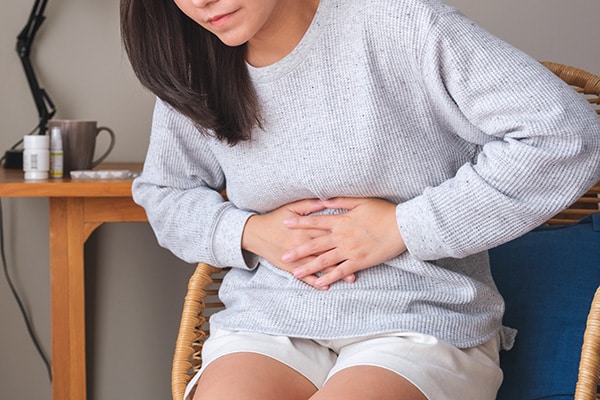Table of Contents
SIBO: Treatment for bacterial overgrowth in the small intestine
The treatment of SIBO, also known as small intestinal bacterial overgrowth, is one of the current challenges for healthcare professionals as this problem is becoming increasingly common and can cause uncomfortable symptoms and affect the emotional quality of life of sufferers.
Excessive bacterial counts of more than 103 coliform bacteria/mL in the small intestine are reported to cause gastrointestinal discomfort that can affect mood.
In many cases, sufferers go through a multitude of consultations (their tests are normal) until they finally reach a diagnosis that will lead to the appropriate SIBO treatment.

Although SIBO has been talked about in the USA for years, in Europe it is still not well known and, therefore, its management and treatment still raise doubts among professionals.
According to many specialists, patients come to the clinic disoriented because the tests are normal but they say they do not feel well. Stomach discomfort is often accompanied by episodes of sadness and tiredness. Hormonal disturbances can also occur in women.
What is SIBO or bacterial overgrowth?
SIBO or bacterial overgrowth occurs when bacteria in the gastrointestinal tract over-colonise the small intestine, where there should normally be fewer bacteria. This can occur because of malfunctioning valves that regulate the flow of food and bacteria through the digestive system, or because of other disorders that affect intestinal motility.
Bacterial overgrowth can interfere with proper digestion and nutrient absorption, leading to a range of unpleasant symptoms.

How do I know if I have bacterial overgrowth?
Before the diagnosis of SIBO, some people report feeling heavy after meals, especially with digestion problems, bloating and flatulence.
However, the brain-gut connection also has an impact on SIBO and its treatment, as a situation of gut dysbiosis has also been linked to headaches, hormonal problems and even skin disorders… We are a whole, and that whole, which is misaligned through the microbiota, manifests itself in disparate disorders in various organs.
Even so, we can list the following common symptoms in SIBO:
- Abdominal distention
- Abdominal pain or discomfort
- Excessive flatulence
- Diarrhea or constipation
- Fatigue and weakness
- Unintentional weight loss
- Nutritional deficiencies
Bacterial overgrowth can also be associated with excessive tiredness, rosacea, generalised pain, tendency to sadness… In particular, the following symptoms of SIBO can be noted according to the subtypes of bacteria that have increased in the digestive tract:
- Hydrogen SIBO: abdominal bloating, gas, poor food tolerance, diarrhoea and yellowish stools.
- Methane SIBO (also known as SIMO): characterised by slower transit, floating stools… and often involves weight gain.
- Hydrogen sulphide SIBO: this type of SIBO manifests with more extra-digestive symptoms such as excessive heat, migraines, sweating, etc. It is also characterised by intestinal disturbances (diarrhoea or constipation) and foul-smelling flatulence.

WHY SIBO
A sedentary lifestyle and a diet deficient in nutrients can be considered risk factors for the development of intestinal dysbiosis.
The effects of polymedication, breastfeeding, type of birth and hormonal alterations such as endometriosis are also studied in the alteration of the microbiota.
There is also talk of an organic predisposition to SIBO, especially when taking certain drugs and having immunological alterations. In addition, senility (alterations in the intestinal bacterial flora can occur from the age of 70-75) and polymedication do not contribute to the balance of the intestinal microbiota.
SIBO TEST AND OTHER DIAGNOSTIC TESTS
- The objective measurement in the clinic is a duodenal aspirate culture via endoscopy. However, it is not infallible and is uncomfortable for patients.
- Another recurrent test is the Breath Test from a glucose or lactulose substrate. This is usually more common.
How to get rid of SIBO naturally?
LOW-FODMAP DIET
A diet low in fermentable carbohydrates (FODMAPs) is generally recommended.
These types of FODMAP foods (fermentable oligosaccharides, disaccharides, monosaccharides and polyols) can easily ferment in the gut, which can worsen the symptoms of SIBO.
Guidance table with foods rich or moderate in FODMAPS:
- Dairy products with lactose
- Cereals: wheat, rye, barley ….
- Legumes: beans, chickpeas, lentils…
- Fruits high in FODMAPS: nectarine, watermelon, blackberry, apple, pear, plum, mango, peach….
- Vegetables: cabbage, pumpkin, asparagus, artichoke…..
Hifas SIBO Study
A prospective, randomised, single-centre study has recently been carried out with SIBO-positive IBS (Irriable Bowel Syndrome) patients from the Andalusian Functional Digestive Disorder (FFD) Unit in order to improve the patients’ quality of life.
The control group followed a low FODMAPS diet.
The intervention group combined the use of supplements from specific strains of Reishi and lion’s mane.
In this study, analytical data and nutritional profile, breath test and complete Bio-Psycho-Social nutritional assessment were collected.
Antibiotics
Antibiotics are a commonly used option to treat SIBO. However, it is important to note that antibiotics can affect the beneficial gut flora, so it is essential to use them under the supervision of a doctor.
Probiotics
Although it may seem counterintuitive, in some cases, probiotics can be beneficial in treating SIBO. By choosing the right probiotics, beneficial bacteria can be restored to the gut, helping to balance the microbiota and reduce the overgrowth of unwanted bacteria. However, not all probiotics are appropriate for SIBO, so it is important to get specific recommendations from a healthcare professional.
Lifestyle changes
In addition to the treatments mentioned above, making lifestyle changes can help control SIBO and prevent its recurrence.
This can reduce stress and improve sleep quality. In this regard, regular exercise and avoiding excessive alcohol and tobacco consumption are also measures that can improve gut health.
Summary: Treatment of SIBO requires major dietary changes and other measures to restore intestinal eubiosis.
SIBO is already a pervasive problem in society that, with the right approach, can be effectively treated. Proper medical supervision and lifestyle changes are essential to restore gut health and alleviate the symptoms of SIBO.
If you are experiencing symptoms related to SIBO, we recommend that you consult a gastroenterology doctor and expert nutritionists who will provide you with an accurate diagnosis and a treatment plan tailored to your individual needs.
WE RECOMMEND

Linoleic Acid: Why This Essential Omega-6 Is Vital for Your Health
☑️ Linoleic acid is a polyunsaturated omega-6 fatty acid essential for human health, as the body cannot synthesise it and must obtain it through diet. This fatty acid plays several critical roles, including supporting skin integrity, contributing to the formation of cell membranes, and serving as a precursor to important bioactive compounds. Its anti-inflammatory properties and role in maintaining the skin barrier make it particularly beneficial for skin health. Understanding the importance of linoleic acid and ensuring adequate intake can significantly impact overall well-being.

Are all red mushrooms toxic?
Red mushrooms are often perceived as toxic, but sometimes other properties are also recognised. Let’s discover them together in this post.
